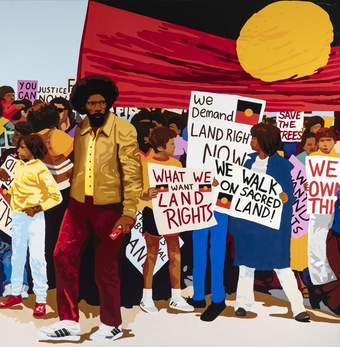Richard Bell lives and works in Brisbane. He is a descendent of the Kamilaroi, Kooma, Jiman and Goreng Goreng peoples. He was an activist and community worker for the New South Wales Aboriginal Legal Service in the 1980s before becoming a full-time artist and co-founding the Aboriginal art collectives Campfire Group in 1990 and proppaNow in 2004. He works across painting, installation, performance, and video. Bell is one of Australia’s most significance artists and his work explores the complex artistic and political problems of Western, colonial and Indigenous art production. He grew out of a generation of Aboriginal activists and has remained committed to the politics of Aboriginal emancipation and self-determination.
Ghillar Michael Anderson was born in the township of Brewarrina in northwest NSW into a state-controlled family. He is an Euahlayi Elder and Aboriginal activist with a long career in defending people’s rights. From 1969 he was a leader in the Australian Black Power movement. His peers appointed him as the first Aboriginal ambassador to White Australia after he and three comrades established the Aboriginal Tent Embassy on the front lawn of Parliament House in 1972.
Megan Cope is a Quandamooka (North Stradbroke Island in South East Queensland) artist whose site-specific sculptural installations, video, paintings and public artworks investigate issues relating to identity, the environment and mapping practices. Cope’s work often resists prescribed notions of Aboriginality, and examines psychogeographies that challenge the grand narrative of ‘Australia’ and our sense of time and ownership in a settler colonial state.
Liisa-Rávná Finbog is a Sámi Indigenous museologist and archaeologist from Oslo/Vappste/Skánit on the Norwegian side of the border. She is currently a postdoc based in Tampere, Finland, where she is working on the relation between land and aesthetical practices of creation in an Indigenous context. She was also one of the curators for the 'Sámi Pavilion' at the 2022 Venice biennale, and also holds a position as a curator at KORO – Public Art Norway, the Norwegian government’s professional body for art in public spaces.
Sylvia McAdam (Saysewahum) is from the Treaty 6 lands in what is now called ‘Canada.’ She is a direct descendant of Treaty peoples and Original peoples of these lands and from the nēhīyaw Nation. She has her Juris Doctorate from the University of Saskatchewan and a Bachelor degree in Human Justice from the University of Regina. McAdam is co-founder of a global grassroots Indigenous-led movement called ‘Idle No More’. ‘Idle No More’ has changed Canada’s political and social landscape and reached the global community to defend and protect all lands, waters, and animals.
Alan Michelson is a New York-based artist, curator, writer, lecturer and Mohawk member of the Six Nations of the Grand River. He has been a leading practitioner of a socially engaged, critically aware, site-specific art grounded in local context and informed by the retrieval of suppressed histories. Current and recent exhibitions include the 14th Gwangju Biennale, Enmeshed at the Tate Modern, and Greater New York 2021 at MoMA/PS1. His solo exhibition Alan Michelson: Wolf Nation was presented at the Whitney Museum of American Art in 2019–2020. Michelson was co-founder and co-curator of the groundbreaking Indigenous New York series with the Vera List Center for Art and Politics at the New School.
Papi’s Pickles is a social enterprise cooking fresh South Indian and Sri Lanka food, made by women from these communities who relocated to the UK due to the conflict in Sri Lanka.
proppaNOW is an Indigenous arts collective which was set up in Brisbane in 2003 to give urban-based Aboriginal artists a voice. They present a unique and controversial perspective of black Australia which is sometimes confronting and always thought provoking. The name proppaNOW best encapsulates the philosophy of what the collective is all about. They approach everything in a considered manner whilst providing a supportive environment for members to explore current social and cultural issues through art. The collective creates art that raises awareness of Aboriginal urban expression that depicts a contemporary story. They reinforce that Aboriginal Australia is a living culture that has evolved over time. Current members include Vernon Ah Kee, Tony Albert, Richard Bell, Jennifer Herd, Gordon Hookey, Laurie Nilsen and Megan Cope.


